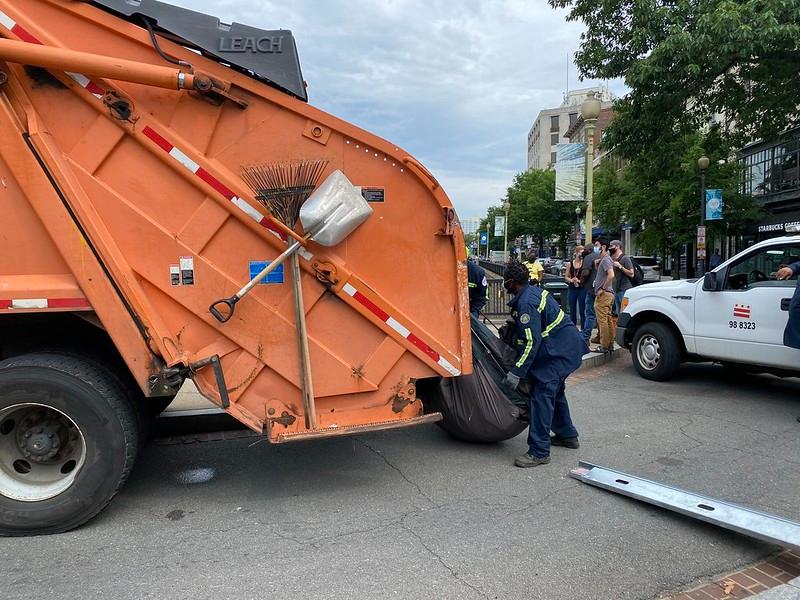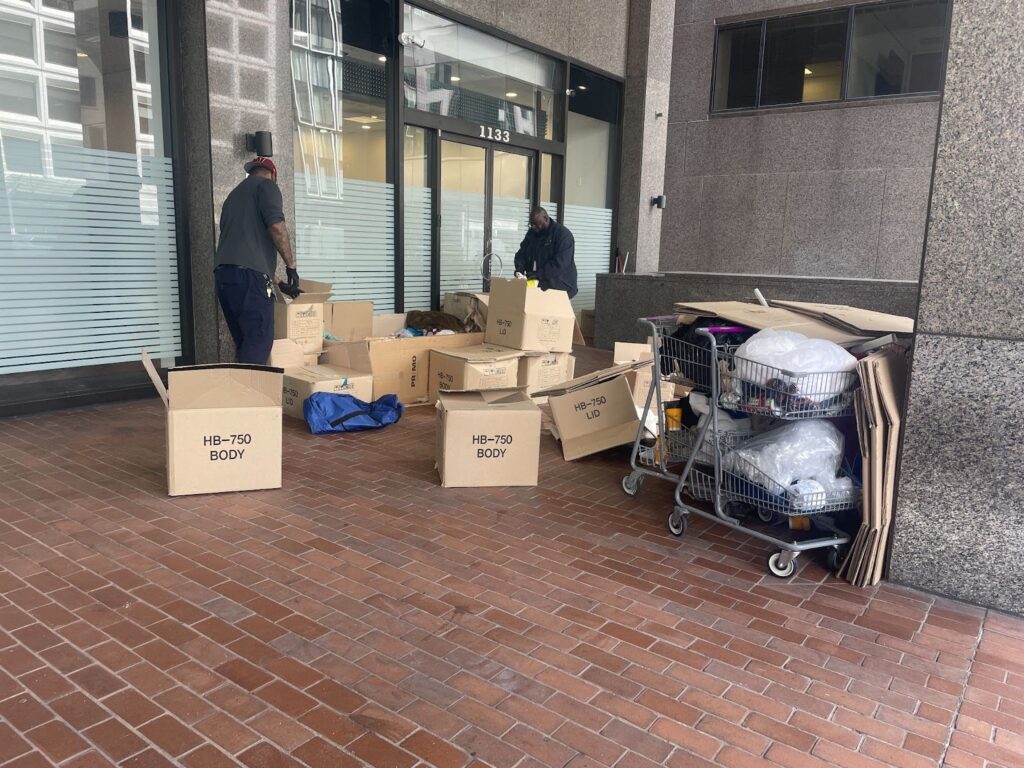The Office of the Deputy Mayor for Health and Human Services (DMHHS) coordinated a trash-only cleanup on June 8 at two encampments located on a bridge at the intersection of Q St. NW and Connecticut Avenue NW near Dupont Circle.
DMHHS originally scheduled a full cleanup for one of the encampments, rather than a trash-only one, but downgraded it the day before it was set to take place. Before this change, advocates criticized the proposed cleanup — through testimony at a D.C. Council hearing and on social media — for forcing homeless residents out of the area to make room for a “streatery,” or outdoor dining space for a nearby cafe.
The permit applicants have pushed back against that criticism, saying they filed for the permit to use the space before the encampment residents were living there. The question is on hold for now because no full cleanup was carried out. But the dispute briefly made it the center of a larger conversation about who has the right to public spaces like streets.
An encampment is considered a residence of one or more people on public property that is present even when an individual may not be, according to DMHHS. Full cleanups, or encampment protocol “engagements,” give residents two weeks’ notice before city workers and volunteers throw away any garbage or belongings within 200 feet of posted notices, sometimes also powerwashing the sidewalks. During trash-only engagements, residents do not need to move their belongings and city workers only remove trash or any property residents identify as garbage.
Sean Thomas and his neighbor Mike (who asked not to use his last name), two homeless residents of the area, said they received hand-delivered notice of a Public Space Occupancy permit for the area in March. The permit filed by Historic Dupont Circle Main Streets, a non-profit organization that maintains the Dupont Circle area, offers nearby restaurants the right to temporary sidewalk table service from March 27 to June 25.

According to Thomas, the installation of “streateries” are forcing people experiencing homelessness out of unused public space at the Dupont encampment. Thomas pointed out that there is no way to block off the open area, where delivery trucks stop daily, from homeless residents returning to re-set up their tents and belongings. “The problem is they don’t want us here. They’re using them to force us to leave.” After the cleanup, Thomas moved his belongings across the street to a park bench.
“They said they are going to put tables right here for a restaurant. They can’t do that. You want us gone that bad?” Mike said. “A person shouldn’t have to worry about being put out on the street. We already have that problem, that’s where we are already at, having to worry about demolition on the street, that’s stressful.”
Bill McLeod, executive director of Historic Dupont Circle Main Streets, filed the permit on behalf of Zeleno’s Cafe on Connecticut Avenue NW. “Zeleno spoke to me about three months ago — wanting more café seating,” McLeod wrote in an email. “This little coffee shop is barely making it and trying to expand, which is why they wanted to have more tables on the street.”
Alexander Gotzev, co-owner of Zeleno’s Cafe, explained that Historic Dupont Circle Main Streets applied for a permit for general outdoor seating, not the cafe itself. “It shouldn’t even be in our name. Of course we would take advantage of extra seating, but we would never want to inconvenience others or have it if it had other intentions,” he said of the seating stopping encampment residents from returning. “I would hate to be associated with it,” Gotzev added. Gotzev said the cafe is not equipped with the service or funds for seating across the street. The groups of encamped tents are approximately 150 and 400 feet from the cafe respectively.
According to the deputy mayor’s office, the engagement was changed to a trash-only engagement because the permit holder was not ready to use the space. “While they had a permit, they did not have the supplies to occupy the space immediately. Therefore, we determined that this should be a trash-only engagement,” said a DMHHS spokesperson.
Community advocates spoke against the replacement of the encampment with a streatery during a D.C. Council Committee on Health budget oversight hearing the day the cleanup was downgraded. Before the engagement was downgraded to a trash clean-up, Jesse Rabinowitz, senior manager of policy and advocacy at Miriam’s Kitchen, explained in the hearing that the engagement would coincide with the placement of tables and chairs and prevent residents from returning.
“Why is it possible to apply for permits for streateries but not survival?” Rabinowitz asked in the hearing led by Ward 7 Councilmember Vincent Gray. “Because D.C. has prioritized catering to rich, white people’s ambiance, preferences, without ensuring people are not dying without housing.”
Thomas, who has been living in his tent near Dupont Circle since January, said he is forced to miss work during encampment cleanups like this one to ensure his belongings are not thrown away by city workers. Thomas has a large tent, a Moped scooter, and cooking supplies that he shares with others in a small community of residents. When encampment sweeps occur, he moves his belongings temporarily across the street and returns once city workers are gone.

According to Thomas, no full cleanups had been conducted in the area since he’d been living there, but a notice for an engagement appeared soon after he moved into a larger tent that allowed him to have seating inside off the ground. “I was in prison for 15 years. I don’t want to live in something smaller than a prison cell,” Thomas said. “I have to have standing room.”
Mike likewise moved from a smaller “dog house” tent to a larger tent. Mike thinks that the larger tents that take up more space are one of the reasons for the engagement. “It was cool when I was in a dog house but once I got this tent, they said, ‘Oh, he’s too self efficient [sic],’” Mike said.
The originally-scheduled cleanup marks an uptick in full engagements following the COVID-19 pandemic. The Centers for Disease Control (CDC) recommended a pause in encampment cleanups in March 2020 to avoid encouraging people to crowd into congregate shelters, where the risk of contracting COVID was higher than outdoors. The CDC also advised that uprooting individuals’ homes could spread the coronavirus as people experiencing homelessness moved elsewhere in the city.
[Read more: DC encampment ‘cleanups’ pick up the pace, largely rely on free labor to temporarily move residents’ belongings]
Early on in the pandemic, the District initially continued encampment cleanups despite the CDC recommendations. City engagements of the encampment protocol then shifted to majority trash cleanups that did not require the relocation of tents and property. Since Jan. 1, D.C. has conducted 16 full cleanups, half of which took place in May and June. Another 20 trash-only cleanups were carried out from January through March.
One consequence of the last-minute change in the cleanup was that the start time changed. “We were going to move so they could power wash,” Fabian, another resident of the encampment, said. “I was told 10 a.m. originally but it started early because it was just trash cleanup.” According to Fabian, the cleanup began around 8:30 a.m. A few critics of the cleanup who did not trust that the engagement had been downgraded showed up to observe the activity that morning.
One tent was removed and trashed at the Dupont encampment on the morning of the engagement with the permission of the resident who abandoned his tent, according to DMHHS.

In an email to Street Sense Media, Ward 2 Councilmember Brooke Pinto emphasized her commitment to establishing long-term shelter resources beyond encampments for those experiencing homelessness. There are no low-barrier shelters for men in Ward 2. There is one for women, located in Chinatown, that was opened instead of a family shelter as part of Mayor Bowser’s plan to replace the shelter at D.C. General with a new family facility in all eight wards.
Advocates from The Way Home, a campaign to end chronic homelessness locally, called for Bowser to set aside $100 million toward permanent supportive housing (PSH) vouchers to establish long-term housing for 3,100 households. Bowser’s 2021 budget proposal includes funding to end homelessness for between 598-758 individuals and 280-347 families through PSH, a maximum of 1,105 households or approximately one third of what the advocates say is needed. Pinto supported The Way Home’s $100 million request for vouchers in her budget priorities letter to Bowser in March.
[Disclaimer: Street Sense Media belongs to the Way Home Campaign but this organizational partnership does not influence our news department. Read more about our editorial independence at streetsensemedia.org/ethics]
“My priority remains to move our unhoused neighbors into housing as quickly as possible,” Pinto wrote. “I asked the Mayor for significant funding in the budget for permanent supportive housing vouchers and will be working with my colleagues to increase funding for this housing-first approach.”
Thomas and Mike moved their belongings in advance of the cleanup, even though it was trash-only. Still, Thomas plans on returning home. “As long as they don’t touch me or my belongings they’re going to need Congress to pass a bill to get me to leave,” Thomas said. “I was born in the park right there. How are you going to get me to leave my own neighborhood? My own home?”
DMHHS said it has no plans to reschedule an engagement at the Dupont encampment. The next engagement is a full cleanup scheduled for 10 a.m. on June 17 at 198 Virginia Ave SE.
John Woolley contributed to this report.








